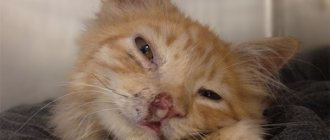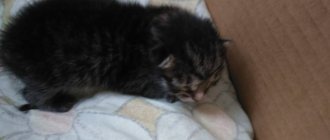Possible reasons
We love our animals, closely monitor their health, noticing the slightest deviations from the norm. If the kitten starts sneezing, what should you do in this case? There is no need to panic ahead of time; first, let’s find out the possible reasons that could provoke this process. It can be:
- colds;
- viral infections;
- cancerous tumors, growths and polyps in the nasal cavity;
- asthma;
- gum disease;
- allergic reactions.
After reading the list of possible causes, the owner will decide that there is an urgent need to visit the veterinarian. In most cases he will be right. The last of them is worth considering in detail so that the owner has an understanding of what to do if the kitten sneezes often.
The dog has snot (runny nose) and is sneezing - how to treat it
If your dog is sneezing and sniffling, it most likely has allergies . In this case, other symptoms may appear: itching, swelling of the pharynx, discharge from the ears, increased lacrimation or salivation, in especially severe cases - anaphylactic shock, epilepsy.
Read a detailed article on this topic: “Symptoms and manifestations of allergies in dogs: we figure out what causes them and how to treat them.”
To treat an allergic reaction, you must first find out the cause of its occurrence and identify the irritant. Most often, dogs suffer from food allergies, then it is worth removing chicken, wheat, corn from the diet or changing dry food to grain-free holistic food. If the irritation is caused by pollen, it is enough to limit your pet’s access to flowers. To speed up the healing process, antihistamines are prescribed.
| Drug name | Approximate cost (rubles) per package | Mode of application |
| Diazolin | 20-30 | For older and small dogs, 1 time per day, the children's dose indicated in the instructions |
| Suprastin | 120-150 | 1 time per day (injection or tablet), no more than 2 mg of active substance per 1 kg of animal |
| Allervet (1% for small dogs, 10% for large dogs) | 140-180 | A strong drug is used only to prevent an allergic attack at the rate of 1 ml per 5 kg |
| Desloratadine | 70-90 | 2 mg per 1 kg (vet consultation required) |
| Tavegil | 160-200 | 1 tablet per 60 kg dog weight, 1 time per day |
The second reason for a runny nose in a dog is rhinitis. This is an inflammation of the nasal mucosa caused by any of the above reasons: allergies, hypothermia, or foreign objects. The disease initially manifests itself with sneezing and clear discharge from the nostrils. As the disease progresses, it brings slimy, purulent snot that seals the nasal passages.
Antibacterial or anti-inflammatory drops cope well with the symptoms of rhinitis: “Bresol”, “Divopride”, “Maksidin”.
If your nose is cracked, Vaseline will help. If the lobe is too wet, it requires drying - streptocide powder. If a virus or infection is involved in the disease, you cannot do without antibiotics.
Herbal decoctions and infusions soothe irritated mucous membranes: chamomile, coltsfoot, string. They are dripped 2-3 drops into each nostril.
If a dog sneezes with pus and smells from his nose, then the disease is more serious than a cold. Purulent discharge, crusts around the nose, a sharp increase in temperature are signs of a dangerous viral disease - distemper . You can only protect yourself from it with regular vaccinations.
The infection is especially dangerous for puppies, pets with low immune resistance (due to poor nutrition, cold and damp conditions). It is difficult to cure an animal from distemper. More common is a transient death due to disruption of the central nervous system.
Read a useful article on the topic: “Dangers of cold weather - signs, symptoms, prevention of colds.”
Allergic irritants
It is strongly recommended to remember what caused your pet’s sneezing the last time. Was air freshener sprayed near the cat's potty? Or did one of the family members smoke on the balcony without completely closing the door? If the owner answers yes to one of the questions, the visit to the veterinarian is cancelled.
This is the list of irritants that cause the sneeze reflex in animals:
- Colognes and perfumes. People love the way they smell, cats are not at all happy.
- If mold is found in the apartment, know that it is to blame for the kitten’s condition.
- Sometimes kittens react strongly to pollen. The reaction is accompanied by tearing and sneezing.
- Air fresheners, as described above.
- Detergents and cleaning products.
- Tobacco smoke.
What to do if the kitten starts sneezing? Make sure that the listed irritants are absent, paying attention to the presence of mucous discharge from the animal’s nose. If clear mucus is present, contact your veterinarian.
Associated symptoms
The likelihood of pathological causes increases along with the expansion of symptoms. If you notice at least one of the symptoms listed below, be sure to sign up for a diagnosis at a veterinary clinic.
Difficulty breathing and wheezing
When cats have breathing problems, they wheeze, snore, or begin to breathe from their belly. This method of breathing is accompanied by a distinct movement of the abdominal cavity and weak movement of the ribs. These changes indicate pain that interferes with normal pulmonary breathing.
Wheezing, whistling, and sniffling occur when mucous or watery fluid accumulates. This occurs with internal injuries, pneumonia, allergies and swelling.
Lacrimation and suppuration of the eyes
Pay attention to the amount and nature of discharge. Excessive leakage of fluids, the appearance of pus, blood or other impurities is an alarming sign characteristic of an infection or tumor.
Cough
A coughing attack resembles vomiting, but excludes the appearance of a watery mass. The sick animal presses itself to the floor, stretching its neck and shuddering in convulsions. Isolated cases are not dangerous and go away on their own. If the frequency increases and your pet begins to wheeze and cough up mucus, call your doctor.
Nose bleed
A condition accompanied by the appearance of blood always requires medical intervention. Nosebleeds occur with injuries, allergic reactions, colds, inflammatory processes and low air humidity. Blood from damaged vessels can drain into the stomach, causing vomiting, or rise through the nasolacrimal duct directly to the eye sockets.
Asymptomatic sneezing
The absence of symptoms is not always a reason to celebrate. If the sneezing persists and there is no clear connection with physiological reasons, it is better to play it safe. Some pathologies may remain asymptomatic for a long time. It is impossible to detect them in the early stages on your own, so it is safer to take a blood test and do an ultrasound with x-ray.
Infection or not?
When your kitten is constantly sneezing and his eyes are watery, this is a sign of an eye infection. You can alleviate his condition by wiping his eyes with chamomile infusion. It will relieve inflammation, thereby reducing the frequency of sneezing. Proof of infection is abundant discharge of mucus from the nose, colored gray or brownish-yellow.
To make an accurate diagnosis, it is recommended to take your pet to a veterinary clinic.
A kitten sneezes often: when should you see a doctor?
The reason to see a doctor is a combination of a runny nose and conjunctivitis. When the disease is limited to these symptoms, the doctor prescribes treatment for allergies.
The health and life of the kitten are threatened by the following pathological signs:
- depressed state;
- loss of appetite;
- diarrhea and vomiting;
- rise or fall in body temperature;
- cough;
- dyspnea;
- stomatitis;
- gingivitis;
- lameness.
Treating a kitten for a virus
This subsection is for informational purposes only; all manipulations are carried out only after an accurate diagnosis has been established. Medicines are prescribed by a veterinarian, who also explains how to use them.
Has your kitten caught a viral infection? The specialist will prescribe antibiotics and anti-inflammatory drugs. Among the first, the most common are “Maxidin” and “Fosprenil”, which kill viruses in the baby’s body. “Baksin” and “Gamavit” are responsible for restoring a pet after an illness.
Prevention
To eliminate the possibility of a kitten constantly sneezing, you first need to carry out frequent wet cleaning of the room. In this case, it is necessary to use only safe products that will not cause allergies in your pet.
To prevent dangerous and intractable diseases, the kitten must be vaccinated in a timely manner.
Also, do not forget about preventive appointments with a veterinarian at least once every 3-4 months. This is necessary because Some diseases develop secretly, for no apparent reason, and visiting a specialist will help identify the problem in a timely manner and even save your pet’s life.
And most importantly, do not forget to examine the animal yourself, observe its habits in order to notice strange behavior in time. Only a caring and attentive owner will have a healthy and happy pet.
1111
Nasal rinsing
After reading the article, the owner will know what to do if the kitten sneezes. You should be prepared for the fact that the veterinary clinic will prescribe a nasal rinse with saline solution or chlorhexidine. Representatives of cats cannot stand this procedure, resisting with all four paws and teeth. The kitten must be wrapped in a towel or blanket before proceeding. The step-by-step instructions look like this:
- Warm the solution to room temperature.
- Draw the required amount into an insulin syringe without a needle.
- Hold the kitten between your knees. If there is an assistant, he sits the baby on his lap, supporting his muzzle with his right hand.
- Raise your pet's head and carefully pour the solution into the right nostril. The animal will begin to snort and sneeze. You need to wait a while, giving it the opportunity to get rid of excess liquid.
- Carry out a similar manipulation with the left nostril.
- Remove the remaining solution from the muzzle with a paper towel or soft napkin.
What is reverse sneezing?
Reverse sneezing, or reverse breathing, is an involuntary inhalation that resembles a suffocation attack. Most often it occurs in brachycephalic dogs, but is sometimes diagnosed in sphinxes and other felines. Despite the frightening picture, this condition is not a pathology and goes away on its own.
If a mustachioed pet sharply stretches its neck and begins to swallow air noisily, do not rush to get scared. A similar effect is observed when quickly absorbing food or playing too actively. The only cause for concern is too frequent attacks, accompanied by the appearance of other alarming symptoms.
How to instill the medicine?
What should you do if your kitten is sneezing and your veterinarian recommends putting medicine in his nose? The procedure is slightly different from the one described above; here you will need a pipette.
- The pet is fixed as indicated in the previous subsection.
- The muzzle is raised, the kitten's nose looks at the ceiling.
- Holding the pipette at a short distance from the nose, instill the required amount of medicine.
Do not insert a pipette into the nasal cavity, as this can cause injury to the kitten. If the owner did everything correctly, the baby’s muzzle was raised up, then the drops will flow into the nostrils without touching them with a pipette.
Why does a cat sneeze in normal situations?
Common reasons are:
- Allergens . Cats, particularly purebred cats, are very gentle creatures and react sensitively to many factors. This may include dust accumulation, cleaning chemicals, air fresheners, perfumes and deodorants, essential oils, indoor plants and outdoor pollen during the flowering season. Since cats have an excellent sense of smell, strong food odors (spices, onions and garlic, alcohol, citrus fruits) can also trigger sneezing. Or maybe you recently changed your pet’s diet or purchased a new litter box? You need to take everything into account and track what exactly causes sneezing, and then eliminate these causes.
- Hypothermia . Sometimes sneezing occurs if your tailed pet has access to the street and it is snowing or raining. Open windows during the cold season, air conditioning or a fan can also create favorable conditions for the development of pathogens, especially if the cat has a weakened immune system. Because of this, fever and runny nose are often also noted. Therefore, after getting wet outside or after swimming, you should dry your pet thoroughly and do not allow it to lie on cold floors or drafts.
- Foreign bodies . Cats are very curious, they explore everything with their nose, so they can inhale small objects: particles of plants, insects, water, grains of food. This causes involuntary sneezing to remove the irritant from the mucous membrane. If you suspect that something has gotten into your pet's nose, you can examine his nostrils with a flashlight. If you cannot see anything, it is better to visit a doctor to make an accurate diagnosis and provide appropriate assistance.
- Anatomical features . Some purebred cats have short noses. This structural feature of their muzzle can cause a runny nose and constant nasal congestion.
Preventive measures
If a kitten sneezes, we told you what to do and how to treat it. To avoid the occurrence of a sneeze reflex, it is recommended to follow some rules:
- Refrain from smoking in the apartment.
- Remove flowers that provoke allergic reactions from the house.
- Maintain cleanliness - wipe the dust and wash the floors in a timely manner.
- Do not neglect vaccinations against cat flu, leukemia, etc. Conduct them starting from the age of three months.
Allergy
Dogs see the world around them mostly through their nose; dogs have a highly developed sense of smell (smell in dogs). In modern life, when in recent decades a large number of artificial odors have appeared, plus an additionally extremely difficult environmental situation, especially around large cities, dogs with allergies, like people with allergies, are not uncommon.
The following can serve as an allergy agent for dogs:
- Household chemicals (washing powder, deodorants), perfumes, perfumes, etc.
- Pollen is a strong allergen for dogs; in the spring, dogs often develop seasonal allergies to certain plants.
- Mold.
- Dust, including from carpets, books, etc.
- Tobacco smoke, especially when the owners are non-smokers, and on the street (at the entrance) you and your dog pass by a smoking person.
- In summer, dogs are often susceptible to allergies as a result of insect bites; a dog bite from a snake is especially dangerous.
- The use of a flea collar may cause allergies in some dogs.
- Often the source of allergies is dog food (food allergies in animals).
Allergy symptoms in dogs are accompanied by constant sneezing, watery eyes, coughing, snot, and skin itching (itching in dogs).
If your dog develops an allergy, you need to urgently contact your veterinary clinic, where veterinary specialists will determine the cause of the allergy and prescribe appropriate treatment and give recommendations on feeding and keeping the dog.











